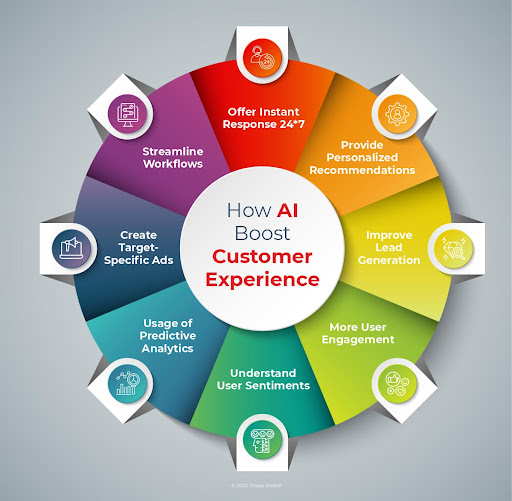Accenture reported that artificial intelligence (AI) can potentially increase corporate profitability by an average of 38% by 2035. With this statement in mind, should you implement a strategy that helps your organization to drive better revenue with AI customer experience?
Well, I think various industries realize the potential of artificial intelligence once implemented in various departments within the company. AI customer experience is one of the most effective strategies to improve your brand’s user engagement, retention, and conversions. However, the implementation of AI technology should be balanced with the human touch for a delightful CX, and this is where the role of emerging technologies like Conversational AI Chatbots becomes prominent.
Elevate CX with Customer Feedback🔥
Collect real-time, in-moment feedback at all touchpoints in customer journey and leverage feedback insights to transform customer experience.

But how does AI customer experience help businesses? This is what this article is all about, driving better customer experience in the age of AI!
What is artificial intelligence?
Artificial intelligence (AI) is a term used to describe a computer or robot that can execute activities similar to those done by humans.
AI sometimes defines the growth of systems that contain the cognitive processes we typically associate with humans, such as reasoning, deriving meaning, generalizing from past experiences, etc. Various types of AI agents can be employed to perform these tasks, each specializing in different aspects of artificial intelligence.

AI is revolutionizing how businesses engage with their customers and operate. In the realm of AI Marketing Tools, AI can personalize campaigns, predict customer behavior, and optimize engagement across various channels. In 2017, at a meeting of the National Governors Association, Elon Musk shared his thoughts on AI, and I quote, “AI is the scariest problem." He said this is one of the inventions that may pose an unappreciated fundamental existential risk for human civilization.
Oh, sorry, did I sway away to the script of Terminator? Sorry for that!
Moving away from the fictional implications of AI, let’s highlight the practical business application of artificial intelligence or its subset, machine learning, for improving customer experience.
Why should businesses worry about customer experience?
96% of customers will leave you for bad customer service - Forbes
If you want to be successful, it's not only about having a great product or pricing or logo design--you also need to make sure your customers have a satisfying experience. And if the customer experience is the new competitive battle zone, then artificial intelligence is your best go-to strategy.
New technology is changing the way we do business, and companies that don't change with it will be left behind. The digital transformation has allowed organizations to engage modern buyers without compromising customer experience - no matter where they're located or what channel they use!
They're becoming more educated, have greater purchasing power, and have access to larger target audiences. Understanding your patrons and developing a marketing plan based on insights is critical to building an excellent AI customer experience strategy.
Why do you need AI customer experience?
More and more businesses are recognizing the value of AI customer experience in improving their users' journeys and meeting contemporary customer's needs.
In its broadest conception, AI can be said to encompass any task that requires knowledge or intelligence to perform. This definition includes a wide range of activities, from the relatively simple (classifying objects) to the highly complex (driving a car).

Customers spend 20 to 40 percent more with companies that respond to customer service requests on social media. - McKinsey
For businesses, AI presents an opportunity to enhance the customer expereince in several ways. One way is by using AI-powered chatbots like the ones developed with the use of GPT-3 and ChatGPT.
Chatbots are computer programs that simulate human conversation. They can be used to answer customers' questions, provide customer support, and even make recommendations.
Another way businesses can use AI to enhance customer experience is by using it to personalize content but before this, it's important to assess the AI expertise of their AI partner. For example, a news website could use AI to recommend articles that might interest a particular reader based on their past behavior.
Finally, businesses can implement AI customer experience strategies to understand their sentiment in a better manner. By analyzing customer reviews and social media posts, businesses can better understand how customers feel about their products and services by analyzing customer reviews and social media posts. Therefore, businesses are recommended to use tools to export Instagram analytics or Facebook data to improve all the pain points. This information can then be used to make improvements.
AI is still in its early stages, but it has the potential to revolutionize the customer experience. Businesses that adopt right AI tools early on will be well-positioned to reap the benefits.
What are the benefits of AI customer experience?
There are many benefits of AI customer experience. Let me give you a better understanding of the same in this section.
1. Real-time decisions with predictive behavior analysis
To make a decision based on the most up-to-date data, such as data from the current interaction that a client has with a company with near-zero latency, is real-time decision-making.
Real-time decisioning is a powerful marketing tool that can be used to engage customers more effectively. For example, you could identify customers using ad blockers and provide them with alternative UI components that would still capture their attention.
Personalized recommendations are a great way to show customers relevant content that they might be interested in. By using AI and real-time decisions, brands can understand customers intent and present them with personalized content and offers. This helps create a better experience for the customer and can lead to more conversions. This procedure is quite similar to the AI tools that can help to analyze the customers’ messages, understand their sentiments, and provide the best possible answer that addresses their issues better.
Predictive analytics is the practice of using statistics, data mining, and modeling to make predictions. Based on these data, the AI models make object detection, predictions and even advanced tasks like AI face swap, which uses machine learning to seamlessly replace or modify facial images.. Because AI can quickly process enormous quantities of information, it employs predictive analytics to provide real-time operational insights that help guide future customer interactions.
Predictive analytics is the term used to describe this behavior, which AI excels at because it can quickly analyze large amounts of data. By integrating Revenue Intelligence systems, businesses can gain insights from vast data sets, helping to guide future customer interactions.
AI and predictive analytics can go farther than merely historical data. They can provide deeper insights into what has happened in the past and what may be done to assist a sale by suggesting related goods and accessories, making the customer experience more relevant and more likely to result in a sale, and fostering a stronger emotional connection with a brand.
2. Offering proactive customer service
86 buyers are ready to pay more for a great customer experience - Spiceworks
AI applications can help businesses uncover common customer issues, predict future problems, and offer real-time personalized experiences. Implementing AI chatbots at customer touchpoints is a great way to address user needs proactively.
Bots are software programs that simulate a natural conversation and provide helpful information while conversing with the user. They can answer familiar queries, give advice and tips during the research phase, or assist customers in making purchase decisions. All these will significantly enhance how your consumers perceive and interact with your brand. Bots can be further enhanced using voice AI and creating a video library to help customers facing difficulties. This is a great way for companies to provide better quality customer service which can help to reduce churn.
3. Generating data-driven customer insights
AI can analyze vast data to identify customer behavioral patterns without breaking a sweat or your spreadsheet. This information helps businesses create customer personas, match customers to products they’re more likely to read about and display the most relevant content to readers.
Some of the data points an AI algorithm can track include:
- Referral sources
- Previous communications
- Geo-specific events
- On-site / in-app interaction
- Purchasing behavior
- Psychographic factors
The more you know about your customers, the better equipped you are to make their experience as pertinent as possible.
4. Content customization with hyper-personalization
Although companies may send out weekly emails to different customer segments, it's often challenging to personalize each email to every subscriber on the list. That is where artificial intelligence (AI) comes in. AI allows you to send highly tailored emails by analyzing subjects of interest and detecting trends to suggest relevant material.
Dynamic emails can be tailored to each reader using AI survey tools, making the experience more personalized. Some factors that play into this are blog posts they have read in the past, interactions with your website, time spent on a specific web page, etc.
Studies show that 67 percent of consumers think it’s essential for brands to adjust content based on context automatically so that these changes can make all the difference.
Hyper-personalization combines artificial intelligence (AI) and real-time data to offer tailored content to a specific customer.
Both consumers and brands are turning to conversational AI and its influence for its ability to provide personalized experiences that are quicker and more convenient than traditional methods, such as waiting on hold for a phone call or clicking through multiple pages.
In addition to a more customized experience, AI can help remove pain points from the customer journey.
Repeating information that consumers have already provided, such as re-confirming a phone number or having to repeat an issue to numerous representatives, is an excellent source of frustration in a world that connects everyone in a snap of the finger!
With conversational AI, businesses can access their customers' prior statements and conversation histories. This allows conversational AI to create more customized responses, making the conversations seem friendlier and, most importantly, less time-consuming.
5. Streamlining organizational workflows
Having an AI chatbot on your website benefits you and the customer. Your team can focus on more challenging tasks while the bot solves common queries.
 Plus, if a customer ever has an issue that the chatbots can't solve, they will be directed to the most appropriate help - a live agent or a knowledge base article.
Plus, if a customer ever has an issue that the chatbots can't solve, they will be directed to the most appropriate help - a live agent or a knowledge base article.
6. Prevent employee burnout
Machines that utilize AI don't need to take naps, have coffee breaks, or call in sick. They can quickly learn new abilities and work ceaselessly with dependable productivity. It’s going beyond the content creation where you can write entire books with AI. That would usually take months.
I'm not saying we should replace employees with machines, but rather illustrating how AI can prevent your employees from ever feeling overburdened and exhausted.
Let your human staff focus on roles that appreciate people skills instead of the overworked responsibilities that technology can handle without complaint. By using a time tracker for employees, you can gain insights into how their time is spent, allowing you to optimize workflows and ensure they focus on tasks that truly require their expertise and creativity.
Concluding thoughts: AI is crucial to the future of conversational customer experience
I think it's all about the code, data, and system that controls how AI functions.
I do fear I will be defending earth from machine invasion. I am really sorry, and I can’t help but include the Terminator reference. I am kidding, and I pray we never have to live the reel world, ever!
I hope my article enabled you to guess the importance of artificial intelligence in customer experience.
Artificial intelligence, machine learning, and big data analytics allow businesses to gain better customer insights. So, to be the market leader, you must devise the right customer experience strategy and remember that AI is just an enabler. It is not at the center of your strategy.







